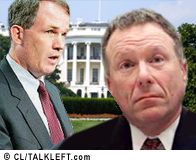Judge Rejects Libby's Use of Memory Expert

In a 31 page opinion I have uploaded here (pdf), the Judge in the Scooter Libby trial today denied Libby's request to use a memory expert at trial. [Background here.]
I'm still digesting the opinion, but the shorter version seems to be:
- The studies relied on by Libby mostly pertain to eye-witness identification and don't fit the facts of his case.
- The 13 points of memory principles Libby expert Robert Bjork would testify to are unlikely to assist the jury because the jurors could figure most of them out.
- Libby has not shown that the traditional method of cross-examining the Government's witnesses would not be sufficiently effective.
I wonder whether the Judge has not just handed Libby his first legitimate issue for appeal. I see definite corollaries between the memory principles that affect eyewitnesses and other fact witnesses. It would have been safer for the Government if the Judge had allowed the testimony.
| < The Joke's On Us | Marijuana Reform on Three Statewide Ballots > |



